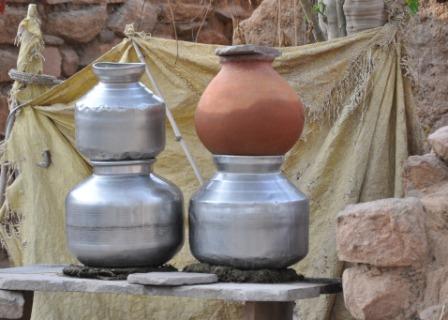/topics/rural-water
Rural Water
Realisation of the fundamental right to water in rural areas: Implications of the evolving policy framework for drinking water – An article by Philippe Cullet in Economic and Political Weekly
Posted on 13 Apr, 2011 10:20 AMThe fundamental right to water in rural areas is well-established in India, but the actual content of this right has not been elaborated upon in judicial decisions. There is no general drinking water legislation that would provide this missing content.
New policy framework for rural drinking water supply: Swajaldhara guidelines – An article by Philippe Cullet in Economic and Political Weekly
Posted on 11 Apr, 2011 07:09 PMIt examines its evolution from the 1970s onwards and focuses, in particular, on the reforms of the past decade, looking more specifically at the Swajaldhara Guidelines. These reforms are of capital importance because they seek to completely change the rural drinking water supply policy framework.
Water pollution in villages - A post in Hindi by Ram Naresh Kumar and Sanjay Singh
Posted on 05 Apr, 2011 02:49 PMगांवों में जल प्रदुषण
Water management through communities in Uttarakhand - Neelima Garg
Posted on 28 Mar, 2011 06:36 PMThe conflict is over how water is perceived, valued and treated. Water is life savior elixir. The importance of water as a vital resource to the life system and an essential component of societal development cannot be over emphasized. Over the years, many ancient civilizations emphasized on various mechanisms of water collection & distribution.
Allocation, release and utilization of funds for safe drinking water in rural and tribal areas under NRDWP for the last three years - PIB release
Posted on 21 Mar, 2011 12:46 PMFunds are released to the States under National Rural Drinking Water Programme (NRDWP) by the Government of India for providing drinking water supply in rural areas covering the rural and tribal areas of the State.
About 30% of rural household’s access piped drinking water from taps. However, full coverage of rural habitations is about 75%.
Pest and disease management in organic, natural, sustainable agriculture - Presentations from the South Asia Conference on "Outstanding Organic Agriculture Techniques", Bangalore organised by OFAI (2009)
Posted on 20 Mar, 2011 06:17 PM This set of presentations from the conference on Outstanding Organic Agriculture Techniques held during September 2009 at Bangalore deals with pest and disease management practices in organic farming, which rely primarily on preventive and integrated methods.
This set of presentations from the conference on Outstanding Organic Agriculture Techniques held during September 2009 at Bangalore deals with pest and disease management practices in organic farming, which rely primarily on preventive and integrated methods.
Crop production and plan protection in organic farming
This paper by S R Sundararaman presents organic farming as the only recourse for farmers, to save both livelihood and the health of the soil. Organic farming methods enable farmers save money and turn their farmyard waste into value-added products for increasing crop production. Farmers will not have to be dependent on agri-business companies for seeds, fertilizers and pesticides. Our self-reliance is thus preserved. A large portion of our country's foreign exchange is used to pay for the import of petroleum products. By going organic we will also help our country save on valuable foreign exchange. Our land will keep giving us returns for extended periods of time unlike farming as per the green revolution, where the land stays productive for a short time and then becomes sterile.
The uppermost question in the minds of farmers who have recently converted to organic farming or who want to turn organic is how to ensure that crop production does not reduce and how to protect the plants from disease, without the chemical fertilizers and pesticides that their fields have grown used to. This paper provides the answers and it also seeks to reassure all farmers that there is no farm which cannot turn around and produce quality crops in sufficient quantity, using organic farming methods.
Conference on "Social Investing to Enhance and Sustain Rural Sanitation Coverage" - WES-Net India, 22nd – 23rd March, 2011, PHD House, New Delhi
Posted on 08 Mar, 2011 12:27 PM Organizers:
Organizers:
- WES-Net India
- FINISH (Financial Inclusion Improves Sanitation and Health)
Venue: PHD Chamber of Commerce and Industry, PHD House, Siri Institutional Area, August Kranti Marg, New Delhi
Topics:
- On Social Investment and MFI in India - The current scenario
- Presenting the Rationale and Results of the FINISH sanitation innovation contest
Demonstration of rural technologies developed by NEERI to stakeholders of the Vidharbha region - National Environmental Engineering Research Institute, 8th March, Nagpur
Posted on 04 Mar, 2011 05:00 PMOrganizer: National Environmental Engineering Research Institute (NEERI)
Venue: National Environmental Engineering Research Institute (NEERI), Nagpur






 Rural household saving water at home
Rural household saving water at home